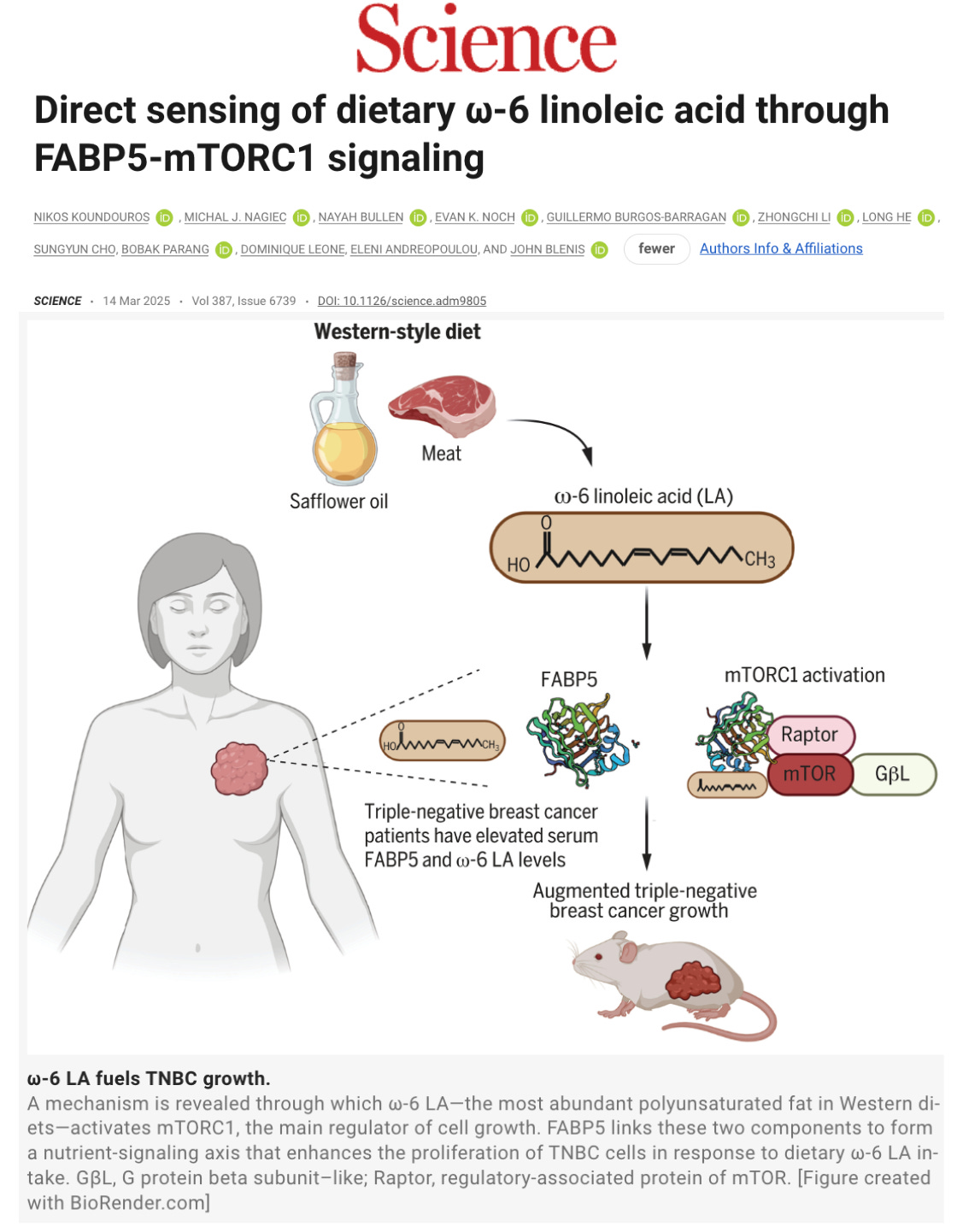Disturbing New Study Ties Seed Oil Fats to Aggressive Breast Cancer Growth
They lied to us about seed oils, but the truth is finally coming out.
This article originally appeared on Focal Points and was republished with permission.
Guest post by Nicolas Hulscher, MPH
Omega-6 fatty acids increase triple-negative breast cancer growth through mTORC1 pathway; population data links high omega-6/omega-3 ratio to increased all-cause and cancer mortality.
The study titled, Direct sensing of dietary ω-6 linoleic acid through FABP5-mTORC1 signaling, was recently published in the journal Science:
RATIONALE
ω-6 linoleic acid (LA) is the most abundant unsaturated fat in Western-style diets and is derived from animal products [grain-fed instead of grass-fed] and processed foods containing vegetable oils, such as safflower oil. Many case-controlled retrospective and prospective studies have been conducted that explore associations between ω-6 LA intake and breast cancer incidence, but the conclusions are often contradictory. Adding to this complexity is breast cancer heterogeneity: Patients are stratified into four main clinical subtypes on the basis of expression of hormone receptors or lack thereof, each with distinct molecular characteristics and therapeutic sensitivities. Because ω-6 LA is an essential nutrient, we hypothesized that the mTOR pathway senses and is activated by its availability, leading to increased breast cancer cell proliferation in a subtype-specific manner.
RESULTS
By leveraging an extensive panel of breast cancer cell lines and patient-derived xenograft (PDX) tumors, we observed that ω-6 LA could activate mTORC1 but only in models of triple-negative breast cancer (TNBC), which is the most aggressive subtype that lacks any targeted therapy. We found that levels of the lipid chaperone fatty acid–binding protein 5 (FABP5) were significantly higher in TNBC compared with hormone receptor–positive tumors and that FABP5 directly interacted with mTORC1 to regulate complex formation, substrate binding, and subcellular localization. Notably, we demonstrated the relevance of this FABP5-mTORC1 signaling pathway in vivo by feeding animals a diet enriched for safflower oil that promoted TNBC tumor growth. FABP5 and ω-6 PUFAs appear to trigger a “perfect storm” of nutrient-driven signaling events, and both factors are also elevated in the serum of newly diagnosed TNBC patients.
CONCLUSION
Accumulating evidence suggests that dietary patterns may influence cancer outcomes, and there is substantial clinical interest in understanding the molecular mechanisms behind these associations to better inform nutritional recommendations. Our findings not only provide a mechanistic explanation for the heterogeneous responses of distinct breast cancer subtypes to dietary fats but also reveal an important perspective on how interactions between ω-6 LA intake and breast cancer need to be studied. Future nutritional studies might consider stratifying patients on the basis of FABP5 expression and triple-negative status.
In simple terms, fats found in seed oils such as safflower, sunflower, soybean, and corn oil are rich in omega-6 linoleic acid, and this study found that linoleic acid doesn’t just serve as a source of energy—it can actively fuel cancer growth by triggering a key growth pathway in aggressive breast cancer cells. Specifically, in triple-negative breast cancer, linoleic acid is sensed by a fatty acid–binding protein called FABP5, which then activates mTORC1, a protein complex that controls cell growth and metabolism. This discovery helps explain why diets high in seed oils may worsen certain cancers and opens the door to personalized nutrition strategies based on tumor type and fatty acid metabolism.
According to a recent population-based cohort study (n = 85,425), the most critical factor influencing health outcomes related to dietary fat intake appears to be the ratio of omega-6 to omega-3 polyunsaturated fatty acids (PUFAs)…
Click here to continue reading this post for free.
Epidemiologist and Foundation Administrator, McCullough Foundation
www.mcculloughfnd.org
Please consider following both the McCullough Foundation and my personal account on X (formerly Twitter) for further content.
Copyright 2025 Focal Points



